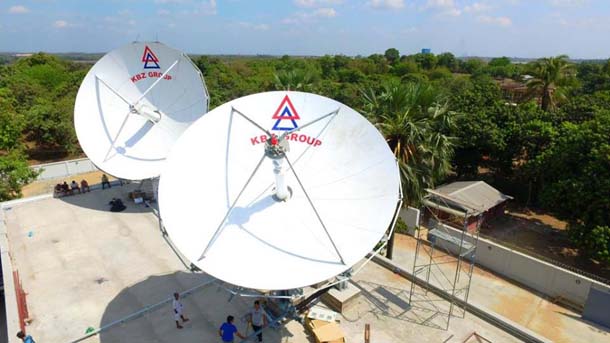RANGOON — KBZ Gateway, a subsidiary of the prominent KBZ Group conglomerate owned by tycoon Aung Ko Win, on Tuesday announced a new platform for high-speed satellite communication services in Burma. Its initial effects will be felt in the banking sector, followed by telecommunications.
The platform is based on VSAT (Very Small Aperture Terminal) technology, and will be delivered in partnership with international satellite broadband firms Hughes Network Systems LLC (HughesNet) and Asia Satellite Telecommunications Company Ltd (AsiaSat).
Seeking improved, faster financial services, KBZ Gateway will initially target the new satellite communication platform at banks, before moving on to telecommunication operators, according to a statement from the firm. KBZ Gateway has established a base plant in the town of Pegu (Bago), northeast of Rangoon, and aims to start operations in roughly two months.
“KBZ Gateway will offer VSAT satellite services to customers across the country, promising safe and speedy international telecommunication services at competitive prices,” the statement said.
HughesNet is a US-based satellite broadband provider, which delivers services to enterprises and government agencies in multiple different countries. AsiaSat is a Hong Kong-based company that operates numerous satellites for commercial use.
Since the launch of political and economic reforms by the previous government in 2011, Burma has seen a rapid transformation in its previously stunted telecommunications sector.
With the ending of a state monopoly, two foreign operators entered the market in 2014, significantly lowering prices and precipitating a dramatic expansion in access to mobile internet and phone services. In June 2015, Burma reportedly had a mobile phone penetration rate just over 50 percent, up from less than 10 percent in 2012.
However, broadband internet services remain expensive, slow and unreliable, in comparison to other countries in the region. Alongside unstable and limited access to the electrical grid in many parts of the country, this continues to hamper business growth and efficiency.

















